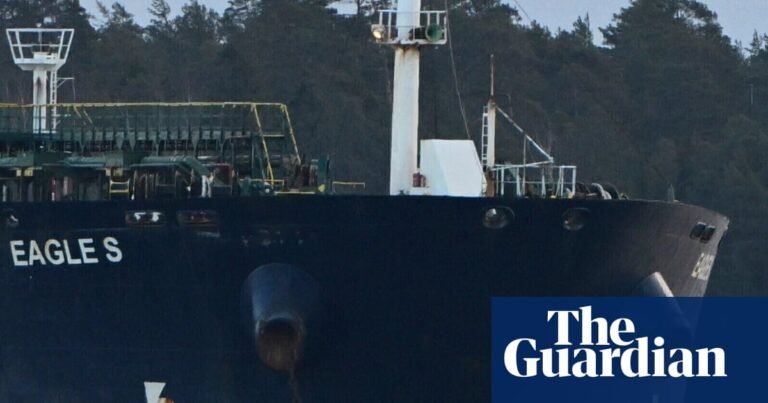Finnish authorities have filed charges against members of the crew of an oil tanker suspected of damaging five undersea cables by dragging its anchor between Finland and Estonia.
Finland’s deputy prosecutor general’s office said on Monday it had filed charges of aggravated sabotage and aggravated interference with telecommunications against the captain and first and second officers of the Eagle S. The Cook Islands-registered tanker is understood to be part of Russia’s “shadow fleet” – comprising vessels that sail under foreign flags to evade sanctions.
The ship was carrying oil from Ust-Luga in Russia across the Gulf of Finland when, prosecutors allege, it dragged its anchor along the seabed for about 90km (56 miles) in December 2024.
The incident was one of several suspected hybrid attacks on telecommunications services in the Nordic region at the end of last year, putting leaders on high alert and prompting accusations of infrastructure sabotage against Russia.
Finnish authorities seized the Eagle S on 26 December last year when the border guard’s emergency response team and police landed on the ship in the early hours of the morning.
The seizure was lifted in February and the ship left Finland the following month.
Damage to the cables had cost their owners, Cinia and Elisa, “at least €60m in repair costs alone”, the office of the deputy prosecutor general, Jukka Rappe, said in a statement.
It added: “The rupture of the extremely high-capacity electricity transmission and telecommunications cables is also suspected of having caused a serious danger to energy supply and telecommunications in Finland, although services have been secured by using alternative connections.”
The defendants, it said, had denied any wrongdoing in the preliminary investigation. They believed that Finland “does not have jurisdiction in the matter because the cable damage sites are outside Finnish territorial waters”, the statement said.
A lawyer for the United Arab Emirates-based Caravella LLC FZ, the owner of the Eagle S, has said previously that Helsinki lacked jurisdiction to intervene.
Rappe disagreed, saying: “The characteristics of the crimes,ie the dangers caused, occurred within the borders of Finland, even though the measures themselves were taken outside Finland.”
He told the Guardian that the question of jurisdiction was “one of the critical questions”, but that “the effects of the crime materialised here in Finland. That brings it to the jurisdiction of Finland, I think. But of course it is up to [the] district court to decide whether Finland has jurisdiction or not.”
He said he hoped the trial would have an impact on investigations into other alleged cable-cutting incidents in the region over the last two years. Because of its geographical positioning, between Russia and the Baltic, Finland is particularly vulnerable. “Finland is like an island because of the Baltic sea. All of our connections go via undersea cables to Sweden, Estonia and central Europe,” said Rappe.
The indictment has been filed with the Helsinki district court, which will decide on a date for the hearing. The state prosecutor, special prosecutor and regional prosecutor have been assigned to prosecute the charges in court.
The three suspects have been under a travel ban in Finland since the start of the investigation.
Cinia and Elisa declined to comment.


